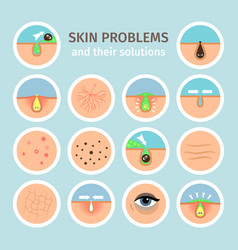Myths And Truths About Acne: Debunking Common Misconceptions
Myths And Truths About Acne: Debunking Common Misconceptions
Blog Article
Writer-Termansen Powers
You might assume that enjoying delicious chocolate or oily foods is the root cause of your acne, but that's simply one of several myths swirling around this common skin condition. As supplemental resources of fact, acne largely originates from clogged hair follicles, not your last dessert. Misunderstandings like these can lead you to embrace inadequate skincare techniques that may even intensify your circumstance. As you browse the facts behind acne, you'll uncover insights that might change your method to skin care and help you achieve more clear skin. So, what actually exists under the surface?
Common Myths Concerning Acne
When it involves acne, lots of people believe in typical misconceptions that can bring about confusion and disappointment. One prevalent misconception is that eating chocolate or oily foods causes acne. While diet regimen can affect skin wellness, the straight web link in between certain foods and acne isn't as specific as several believe.
Another common misunderstanding is that you ought to scrub your face strongly to clear up breakouts. Actually, aggressive rubbing can irritate your skin and get worse acne.
You might likewise think that acne only affects young adults, yet grownups can experience it too, typically due to hormone modifications or stress. Some individuals assume that sun tanning can clean up acne, but sun exposure can in fact result in skin damages and intensify breakouts over time.
Last but not least, lots of think that using harsh items will eliminate acne rapidly. Nonetheless, these items can strip your skin of its all-natural oils, resulting in enhanced irritability and more breakouts.
Scientific Facts Behind Acne
Recognizing the scientific truths behind acne can empower you to tackle this typical skin condition better.
https://www.thetimes.co.uk/article/chinese-men-go-for-cosmetic-surgery-to-boost-their-careers-lffdtwp83 takes place when hair roots end up being obstructed with oil, dead skin cells, and microorganisms. This process frequently begins with an overproduction of sebum, the oil your skin naturally produces. Hormone changes, specifically during puberty or menstruation, can cause this excess oil.
Germs known as Propionibacterium acnes prosper in these clogged up pores, leading to inflammation. When your body immune system reacts, it can cause soreness and swelling, leading to those troublesome acnes or cysts.
Genetics additionally play a role; if your parents had acne, you might be a lot more susceptible to it.
Diet plan and stress and anxiety levels can influence acne too, but research is still advancing in these areas. While enjoying oily foods won't directly trigger breakouts, a balanced diet regimen can sustain your skin health.
Similarly, managing microneedling for hair can lower hormonal fluctuations that might aggravate acne.
Tips for Handling Acne
Managing acne efficiently requires a combination of everyday skin care habits and way of living modifications. Start by establishing a regular skin care regimen. Cleanse your face twice a day with a mild, non-comedogenic cleanser to remove dust and excess oil. Prevent scrubbing as well hard, as this can irritate your skin and worsen acne.
Next, include products consisting of salicylic acid or benzoyl peroxide to aid prevent outbreaks. Constantly follow up with a light-weight, oil-free moisturizer to keep your skin hydrated. Don't fail to remember sunscreen; opt for non-comedogenic choices to secure your skin from UV damages without obstructing pores.
Beyond skin care, focus on your diet regimen. Restriction sweet and greasy foods, and focus on fruits, vegetables, and whole grains. Remaining hydrated is important, so drink lots of water throughout the day.
Additionally, handle anxiety with tasks like yoga, meditation, or workout, as stress and anxiety can activate breakouts.
Last but not least, stay clear of selecting or standing out acnes. This can result in scarring and additional inflammation. If your acne lingers, seek advice from a dermatologist for tailored treatment alternatives.
Conclusion
Finally, it's vital to different fact from fiction when it involves acne. By disproving common myths, you can better recognize your skin and make educated selections for your skincare routine. So, why remain to believe in outdated concepts when the reality can empower you? Embrace healthier routines, concentrate on mild cleaning, and keep in mind that managing acne is a trip. With the appropriate expertise, you're one action more detailed to more clear, healthier skin.
